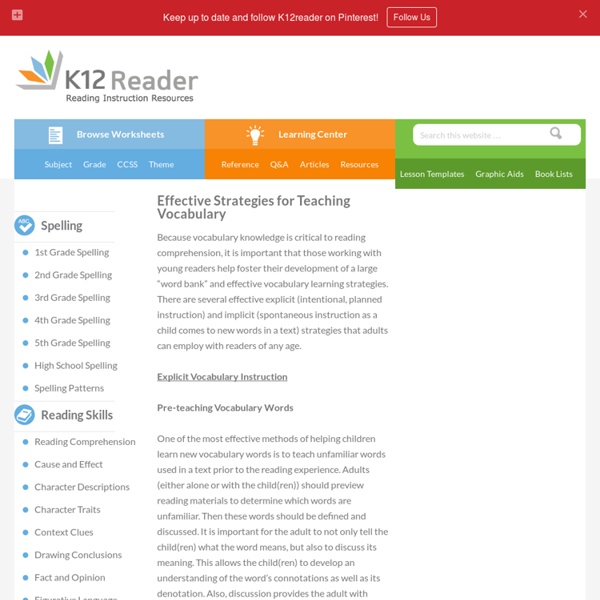Doing It Differently: Tips for Teaching Vocabulary
Every Monday my seventh grade English teacher would have us copy a list of 25 words she'd written on the board. We'd then look up the dictionary definitions and copy those down. For homework, we'd re-write each word seven times. Good, now you know it. Test on Friday and never for those 25 words to be seen again.
Vocabulary Instructional Strategies: Marzano's 6-Step Process
by Kimberly Tyson, Ph. D. Vocabulary and its strong relationship to comprehension has been verified over and over again. Vocabulary plays an important part in learning to read as well as reading to learn.
Expanding Vocabulary, One Schools Creative Idea (ARTICLE)
Expanding Vocabulary, One School's Creative Idea (ARTICLE) We are always looking for clever and creative ideas for supporting children as they work on expanding their vocabulary. We received permission from Darlene, a literacy coach from Canandigua, New York, to share with you her school-wide vocabulary initiative call "Big Dog Words." The initiative is grounded in the research by Isabell Beck, PhD and her work with 'tier two' words. (you can read more about these types of vocabulary words in her book: Bringing Words to Life: Robust Vocabulary Instruction by Isabel L. Beck, et. al.)
Ambiguous Sentences
I came across this headline in the Wall Street Journal: Republicans Grill IRS Chief Over Lost Emails This type of sentence has great possibilities because of its two different interpretations: Republicans harshly question the chief about the emailsRepublicans cook the chief using email as the fuel
Commonly misspelled English words
Commonly misspelled English words[1] (UK: misspelt words) are words that are often unintentionally misspelled in general writing. A selected list of common words is presented below, under Documented list of common misspellings. Although the word "common" is subjective depending on the situation, the focus is on general writing, rather than in a specific field. Official spellings also vary by country or region, with some rejecting the American or British variants as incorrect for the region.[1][2][3] Within a particular field of study, such as computer graphics, other words might be more common for misspelling, such as "pixel" misspelled as "pixle" (or variants "cesium" and "caesium"). Sometimes words are purposely misspelled, as a form in slang, abbreviations, or in song lyrics, etc.
15 Common College Grammar and Spelling Mistakes
As midterms approach, many students are preparing for their first essays of the semester. By college, you should be able to write an effective essay, but we often make the same grammatical and spelling mistakes over and over again. I have no doubt you can use two/too/to and there/they're/their correctly by now, but here are some more advanced common grammatical and spelling errors that make you look silly, both in your writing and speaking.
100 Words for Facial Expressions
By Mark Nichol Face it — sometimes you must give your readers a countenance-based clue about what a character or a subject is feeling. First try conveying emotions indirectly or through dialogue, but if you must fall back on a descriptive term, try for precision: 1. Absent: preoccupied 2. Agonized: as if in pain or tormented 3.
Koprowski - Ten Good Games for Recycling Vocabulary
The Internet TESL Journal Mark Koprowskimarkkoprowski [at] yahoo.com Introduction Learning is remembering. If we respect this axiom, the review and recycling of new language items will be critical if they stand a chance of becoming readily accessible in long-term memory. In fact, students do the majority of their forgetting shortly after the lesson and then the rate of forgetting diminishes.
45 ways to avoid using the word 'very'
Writers Write is your one-stop resource for writers. Use these 45 ways to avoid using the word ‘very’ to improve your writing. Good writers avoid peppering their writing with qualifiers like ‘very’ and ‘really’. They are known as padding or filler words and generally add little to your writing.
The World is Your Oyster
Welcome to Part 2 of my ‘What’s Cooking in the Kitchen’ series. In my previous post, I mentioned that the British Chef, Jamie Oliver is extremely popular with my Russian, Swiss and German clients. His programmes are televised in those countries and he has a huge international fan base.
Synonyms which are really needed . . . a list on 1 page
List of Synonmys A collection of important synonyms grouped in categories: for teachers, writers and students of English alike. Important Synonyms - Popular words to use instead Common Synonyms — sorted by Category These lists also contain examples for the most common 100 words or so; however, the intention is not to replace a thesaurus.




This is a handy resource for new teachers who may be struggling with creativity. the assignments are basic and effective. Anyone can teach them. by mandomtz Nov 8
The strategies being taught here are pretty self-explanatory and easy to follow. I think that it is especially great for first time teachers even if they had no prior experience or knowledge of what to do and reading the steps helps you gain more ideas so that you may use it in your own way. by sandrapollock Apr 3
I like the guide this website has for teaching effective vocabulary. I won't go into each step, but here are the steps in a broad view: pre-teaching vocabulary, repeated exposure to words, key word method, word maps, root analysis, restructuring reading methods, incidental learning, and context skills. When teaching vocabulary I would a teacher could use these methods for any grade level. by tgil Mar 9
I like this for clear strategies on teaching vocabulary. by archie292 Mar 8